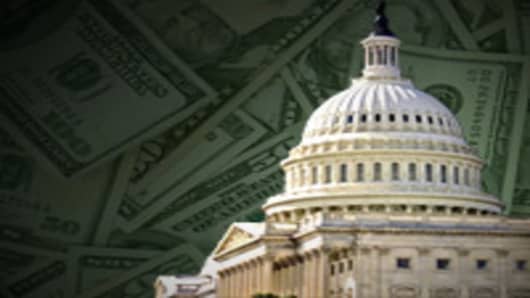The nation’s finances are too important to be subject to this sort of thing, the bloggers say.
Yesterday I tried to provide a corrective to this view. The debt ceiling is a useful political check on government debt accumulation and one of the last vestiges of the constitutional mandate that Congress control the power to borrow on behalf of the United States government, I argued.
“One of the ways in which government is able to operate unaccountably—that is, outside of democratic checks and balances—is by facilitating public ignorance about its activities. The debt ceiling vote helps raise public awareness about the costs of government, keeping government accountable and increasing democratic participation," I argued.
This morning my old colleague Joe Weisenthal at Business Insiderresponded by brushing on the constitutional concerns and attacking the notion that the debt ceiling raised public awareness of government indebtedness.
Weisenthal writes:
This sounds nice in theory, but the great thing is we don't have to rely on theory. We have the real world, and in the real world we know that the debt ceiling doesn't promote public awareness, it promotes public ignorance and demagoguery…
Our politicians demagogue this issue like crazy. Did you know that when Obama was a Senator and George W. Bush was the President he voted against lifting the debt ceiling?
It sure doesn't look like the debt ceiling promotes accountability. It looks like it's mainly a vehicle for opposition Senators to engage in pointless politics.
Beyond that, if the debt ceiling had any delimiting effects, why has spending grown parabolically?
I think Weisenthal is just plain wrong when it comes to the issue of public awareness. We—journalists, politicians, and just plain ordinary folk—are currently engaged in a public debate about the levels of debt accumulated by our government. This debate simply would not be occurring if it were not for our rapid approach toward the debt ceiling. As we get closer to an actual vote, that debate will become even more ubiquitous. A robust public discussion of the financial state of our government is a welcome development.
Let me put it slightly differently. There is a vast array of special interest groups who lobby constantly for additional spending and tax breaks. They stand to derive immediate benefits from the spending and tax breaks, so they are highly incentivized to wrangle lawmaker votes in their favor. But the benefits of debt reduction are diffuse and mainly accrue to a diffuse citizenry at some point in the future. This creates an imbalance in favor of debt accumulation.
The debt ceiling may not be the best mechanism imaginable to create a balance. Surely, going back to the pre-1917 regime in which each and every issuance of debt, including its terms and interest rates, had to be approved by Congress would be more effective. But that’s not likely to be on the table any time soon. So we’re stuck with what we have—a second or third best alternative that is far better than no balancing mechanism at all.
Weisenthal looks at growth of government spending and concludes that the debt ceiling has no practical effects. I think that’s too quick. We have to ask what would happen to spending if the power to borrow were fully vested in the executive branch, with no periodic need to appeal to Congress. I expect that government spending in that case would be even greater. It certainly strikes me as bizarre to assume that this transfer of authority would have no effect at all on government borrowing.
Weisenthal’s also way too dismissive of the constitutional concerns. I do not think Congress is constitutionally permitted to delegate any more of its borrowing power to the Executive branch. And I think this constitutional limit makes sense because it forces Congress to be accountable for the consequences of its spending in a way it otherwise would avoid. It’s all too easy to imagine Congress and the executive conspiring together to conceal from the public the state of the nation’s financial health. The debt ceiling helps prevent that kind of cover-up.
The debt ceiling is a product of two world wars and the New Deal. Perhaps it should be done away with—but only if what we replaced it with was a return to the methods practiced for the first six score years of our Republic. Unfortunately, what we’d likely get if we got rid of the debt ceiling would just be an unlimited, unaccountable and unchecked ability to borrow by the President—which is a recipe for an even faster growing debt burden.
__________________________________________________
Questions? Comments? Email us atNetNet@cnbc.com
Follow John on Twitter @ twitter.com/Carney
Follow NetNet on Twitter @ twitter.com/CNBCnetnet
Facebook us @ www.facebook.com/NetNetCNBC



